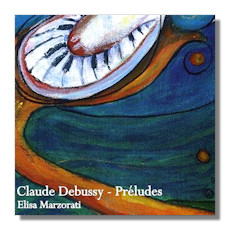
The Internet's Premier Classical Music Source
Related Links
- Debussy Reviews
- Latest Reviews
- More Reviews
-
By Composer
-
Collections
DVD & Blu-ray
Books
Concert Reviews
Articles/Interviews
Software
Audio
Search Amazon
Recommended Links
Site News
 CD Review
CD Review
Claude Debussy

Preludes, Books I and II
- Book I
- Danseuses de Delphes
- Voiles
- Le vent dans la plaine
- Les sons et les parfums tournent dans l'air du soir
- Les collines d'Anacapri
- Des pas sur la neige
- Ce qu'a vu le vent d'ouest
- La fille aux cheveux de lin
- La sérénade interrompue
- La cathédrale engloutie
- La danse de Puck
- Minstrels
- Book II
- Brouillards
- Feuilles mortes
- La puerta del vino
- "Les fées sont d'exquises danseuses"
- Bruyères
- "General Lavine" - eccentric
- La terrasse des audiences du clair de lune
- Ondine
- Hommage à S. Pickwick, Esq., P.P.M.P.C.
- Canope
- Les tierces alternées
- Feux d'artifice
Elisa Marzorati, piano
Samples can be heard at Elisa Marzorati's website
Velut Luna CVLD152 76:47
An excellent recent book about Debussy and his music by Eric Frederick Jensen (reviewed here at www.classical.net/music/books/reviews/0199730059a.php) presents a Debussy intent on creating a distinctive sound world. He did not wish to write music like any of his predecessors – and he did not want imitators or disciples either. He was successful in his first aspiration but of course there was less he could do about the work of successors.
My first hearing of Elisa Marzorati's exemplary performance of Debussy's Préludes transported me vividly – and satisfyingly – to my first-ever hearing of anything by Debussy, which was a performance in Carnegie Hall many years ago – when I was fifteen – of Debussy's first two orchestral Nocturnes, performed by the New York Philharmonic conducted by Guido Cantelli. This was after an intermission, before which were played the Gazza Ladra Overture by Rossini and Brahms' First Symphony, Ravel's Second Suite from Daphnis and Chloe concluded the concert. The Brahms I was already familiar with, along with other works from the German and Russian repertoires, but I don't think I had heard a note of French music, aside from Claire de lune, before. These strange new sounds both fascinated and somewhat disturbed my young ears, beginning with the pre-concert practicing on stage of portions of the French works. Subsequently I learned to love everything by Debussy and I still find his music well-suited to clearing my aural palate from over-exposure to other music.
The two books of Debussy Préludes were published in 1910 and 1913, not long after he completed the composition of each set. He died in 1918, so the second set in particular can be said to be from late in his career. The prelude form is one associated by J. S. Bach in the baroque era, Chopin in the romantic period, and Shostakovich well into the twentieth century. All of these composers completed sets of 24 preludes, accompanied by fugues in the first and last instances. The notes to the present collection describe literary or pictorial associations intended by Debussy. I would suggest that each book of the preludes be listened to separately. Not only are 24 short works a great deal to take in at one time, but there are some stylistic differences between them also. The unsigned notes, presumably by Marzorati, mentions bolder harmony, including bi-tonality, poly-tonality, and even "harsh dissonance" in the second set. Although I have some personal favorites among the pieces, there is no need for me to belabor that here. They speak for themselves and I have no fault to find with the performance of any of them.
Notes are in Italian, German and English – surprisingly not in French, considering the nationality of the composer. Marzorati lives in Venice, where she grew up, and where she studied piano and musicology, with distinction in both cases. She was born in Switzerland and earned her second diploma in Zürich. Besides solo playing, she plays with singers and in chamber music ensembles.
Highly recommended.
Copyright © 2014, R. James Tobin



















